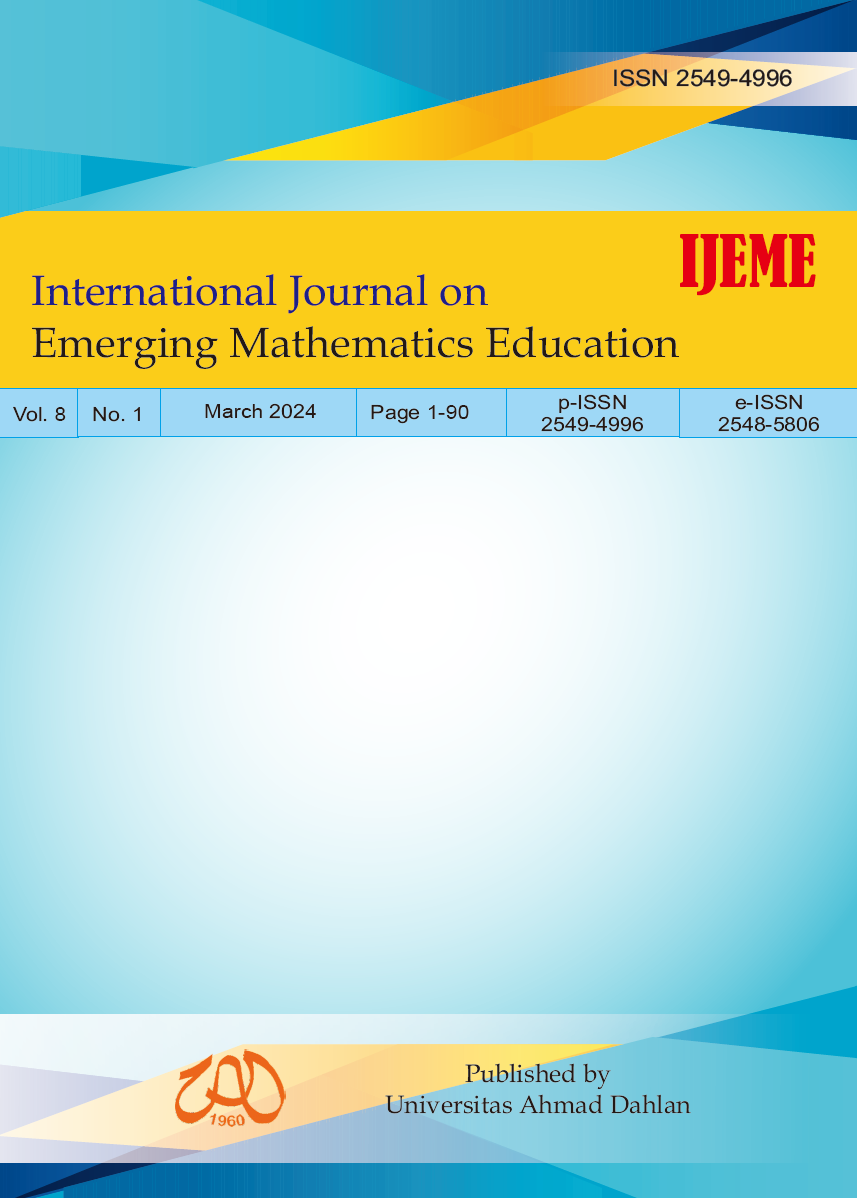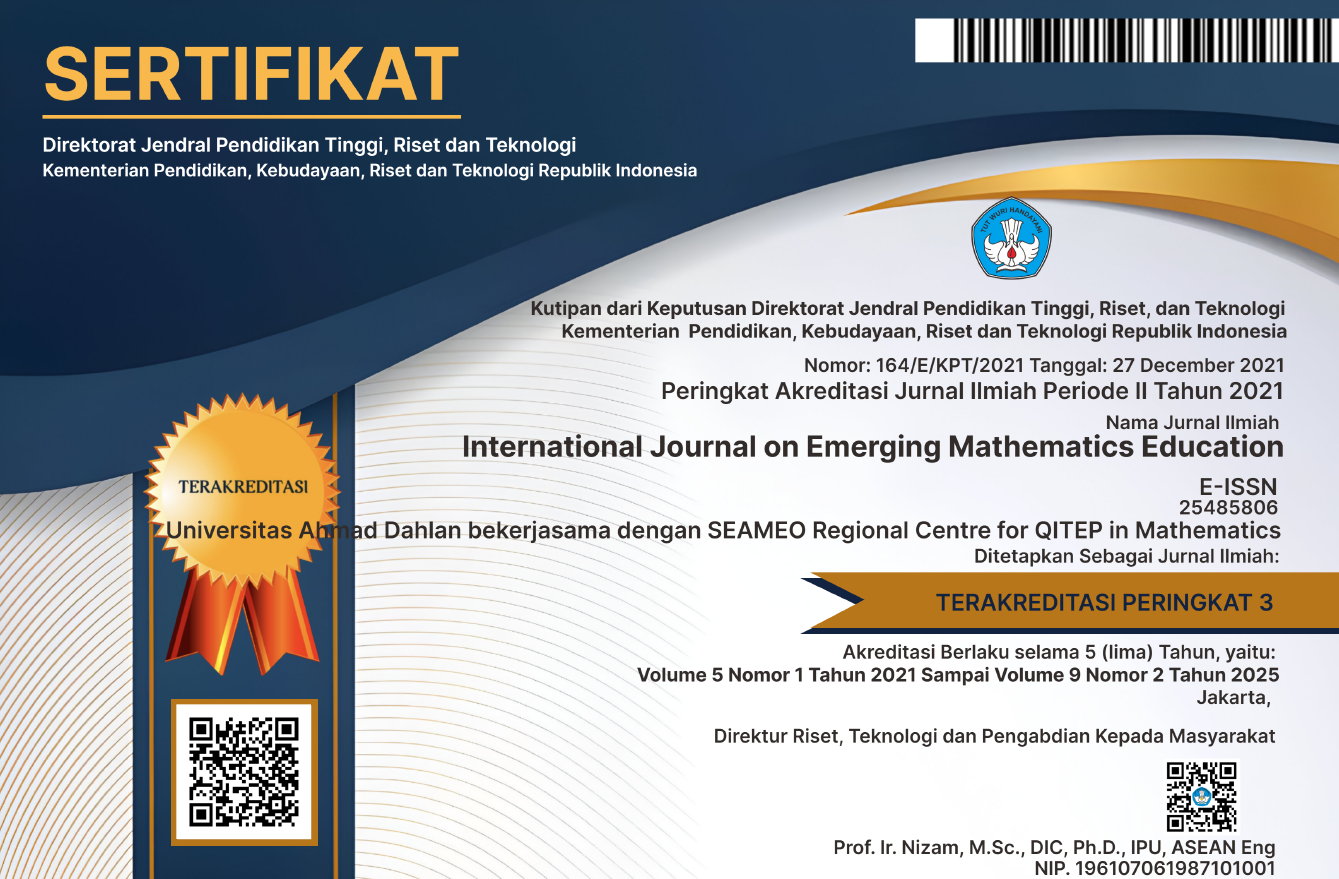Integrating flipped PDF professional to develop a PBL e-worksheet for students’ critical thinking
DOI:
https://doi.org/10.12928/ijeme.v8i1.29589Keywords:
e-worksheet, problem based learning, critical thinkingAbstract
Increasingly advanced and developing technology resulted in the rapid development of science. Students have used smartphones a lot with the help of the internet to learn and obtain information. The impact of the covid pandemic has affected the use of technology. Digital-based teaching materials are needed to support student learning activities. One of the schools that will be used as a research location is SMP Nurul Muttaqin. This study aims to develop a valid, practical and effective Problem Based Learning (PBL) based e-worksheet to improve students' critical thinking skills towards quadrilateral math material. In this study using qualitative methods with the development of 4-D (Four-D Models), namely define, design, develop and disseminate. The instruments used in the study were media expert and material expert validation sheets, student response questionnaires and questions to measure students' problem-solving abilities. PBLbased E-worksheet is said to be valid in terms of media 111.5 with good criteria, and material expert validation obtains an average score of 51 with good criteria. From these results the developed e-worksheet can be declared to meet the validity criteria for a teaching material. Based on the results of the questionnaire the responses of e-worksheet students were said to be practical by small groups and large groups. Based on the student response questionnaire, the small group obtained an average score of 49,2 with good criteria, and the large group obtained an average score of 51.3 with good criteria. In this study, the effectiveness of the e-worksheet was obtained through post-test questions from the treatment group and control group using the independent sample t test and obtained tcount > ttable, so h0 was rejected, which means that learning with treatment groups using the pbl model assisted by eworksheet is effective. to increase the critical thinking of class vii students of smp nurul muttaqin compared to the control group that does not use e-worksheet.References
Cresswell, J. (2014). Research design: Qualitative, Quantitative, and Mixed Method Approaches. SAGE Publication.
Depdiknas. (2008). Panduan Pengembangan Bahan Ajar. Depdiknas.
Hadi, S., & Novaliyosi. (2019). TIMSS Indonesia (Trends in International Mathematics and Science Study). Prosiding Seminar Nasional & Call For Papers Program Studi Magister Pendidikan Matematika Universitas Siliwangi, 562–569.
Nainggolan, D. Y. (2020). Penerapan Model Problem Based Learning (PBL) Untuk Meningkatkan Kemampuan Berpikir Kritis Siswa Berbantuan Aplikasi Math Mobile Learning. Cartesius : Jurnal Pendidikan Matematika, 3(1), 87–100. https://doi.org/10.54367/cartesius.v3i1.796
Pranata, D. P., Frima, A., & Egok, A. S. (2021). Pengembangan LKS Matematika Berbasis Problem Based Learning pada Materi Bangun Datar Sekolah Dasar. Jurnal Basicedu, 5(4), 2284–2301. https://doi.org/10.31004/basicedu.v5i4.1183
Rusdi, A. (2018). Meningkatkan Kompetensi Guru dalam Penyusunan RPP Yang Baik dan Benar Melalui Pendampingan Berbasis MGMP Semester Ganjil Tahun Pelajaran 2017/2018 di SMP Negeri 1 Ambalawi. Jurnal Ilmiah Mandala Education, 4(1), 67-78.
Riduwan, & Sunarto. (2017). Pengantar Statistika Untuk Penelitian Pendidikan, Sosial, Ekonomi, dan Bisnis. Bandung: Alfabeta.
Sugiyono. (2015). Statistika untuk Penelitian. Bandung: Alfabeta.
Sugiyono. (2019). Metode Penelitian Kuantitatif, Kualitatif R&D. Bandung: Alfabeta.
Supriyadi, E., & Suparman. (2019). Design Problem Based Student Worksheet to Improve Student Problem Solving Abilities Indonesia. International Journal of Scientific and Technology Research, 8(10), 3064–3069.
Tunga, M. F., Sumardi, Y., & Hasanah, D. (2021). Pengembangan E-LKPD Fisika dengan Model Project Based Learning pada Materi Rangkaian Listrik Arus Searah untuk Peserta Didik Kelas XII di SMA Negeri 1 Sedayu. Compton: Jurnal Ilmiah Pendidikan Fisika, 8(1), 34–41. https://doi.org/10.30738/cjipf.v8i1.10469
Downloads
Published
How to Cite
Issue
Section
License
Copyright (c) 2024 Budi Widiyaningsih, Hardi Suyitno

This work is licensed under a Creative Commons Attribution-ShareAlike 4.0 International License.
License and Copyright Agreement
In submitting the manuscript to the journal, the authors certify that:
- They are authorized by their co-authors to enter into these arrangements.
- The work described has not been formally published before, except in the form of an abstract or as part of a published lecture, review, thesis, or overlay journal. Please also carefully read the International Journal on Emerging Mathematics Education (IJEME) Author Guidelines at http://journal.uad.ac.id/index.php/IJEME/about/submissions#authorGuidelines
- That it is not under consideration for publication elsewhere,
- That its publication has been approved by all the author(s) and by the responsible authorities, tacitly or explicitly, of the institutes where the work has been carried out.
- They secure the right to reproduce any material that has already been published or copyrighted elsewhere.
- They agree to the following license and copyright agreement.
Copyright
Authors who publish with the International Journal on Emerging Mathematics Education (IJEME) agree to the following terms:
- Authors retain copyright and grant the journal the right of first publication with the work simultaneously licensed under a Creative Commons Attribution License (CC BY-SA 4.0) that allows others to share the work with an acknowledgment of the work's authorship and initial publication in this journal.
- Authors are able to enter into separate, additional contractual arrangements for the non-exclusive distribution of the journal's published version of the work (e.g., post it to an institutional repository or publish it in a book), with an acknowledgment of its initial publication in this journal.
- Authors are permitted and encouraged to post their work online (e.g., in institutional repositories or on their website) prior to and during the submission process, as it can lead to productive exchanges, as well as earlier and greater citation of published work.
![]()
Ciptaan disebarluaskan di bawah Lisensi Creative Commons Atribusi-BerbagiSerupa 4.0 Internasional.





